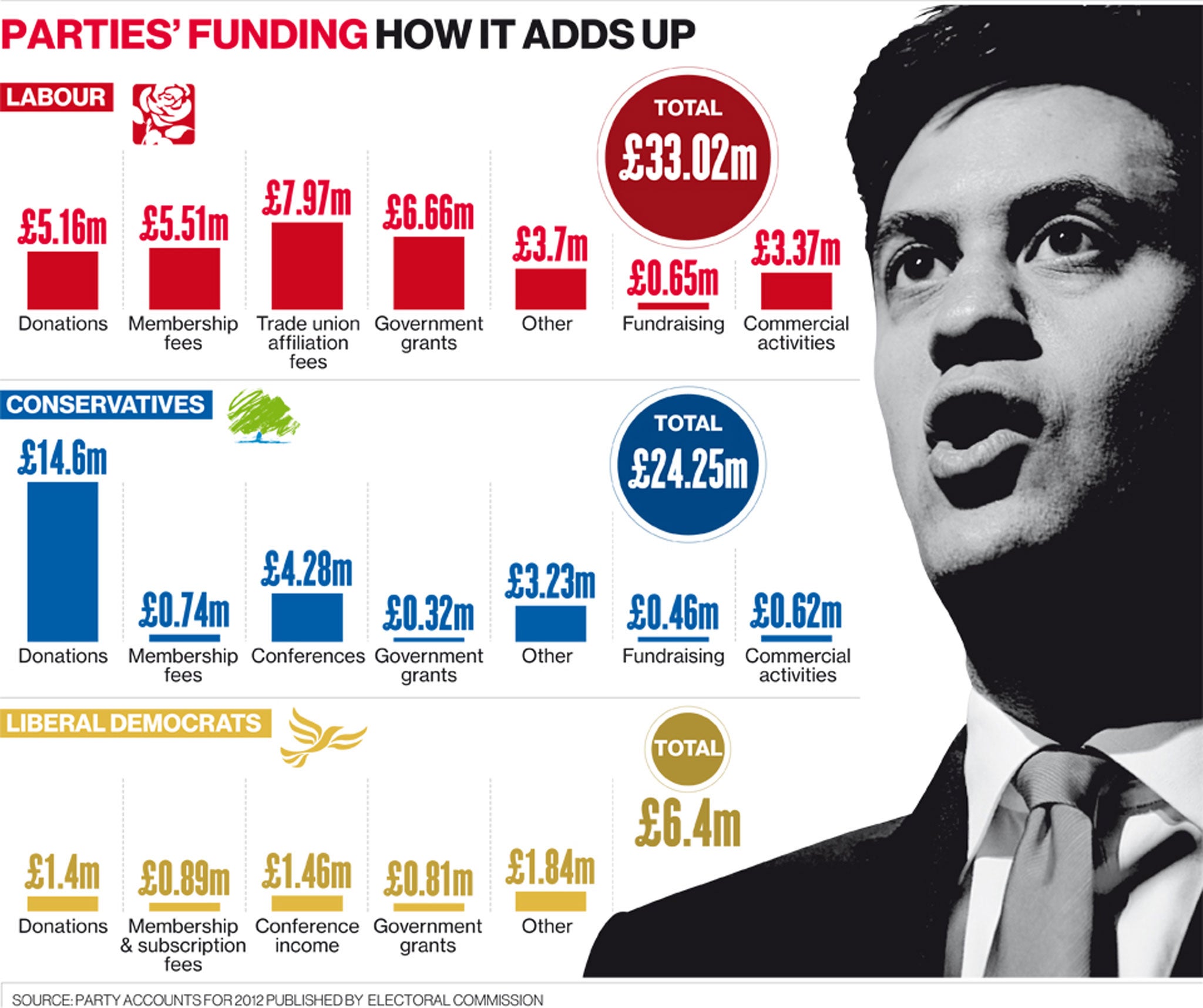A £5,000 cap on donations? Debt-laden Labour call for state funding of political parties
Manifesto at 2015 general election expected to include pledge to 'take the big money out of politics' - but it has yet to reach a consensus with Tories and Lib Dems

Your support helps us to tell the story
From reproductive rights to climate change to Big Tech, The Independent is on the ground when the story is developing. Whether it's investigating the financials of Elon Musk's pro-Trump PAC or producing our latest documentary, 'The A Word', which shines a light on the American women fighting for reproductive rights, we know how important it is to parse out the facts from the messaging.
At such a critical moment in US history, we need reporters on the ground. Your donation allows us to keep sending journalists to speak to both sides of the story.
The Independent is trusted by Americans across the entire political spectrum. And unlike many other quality news outlets, we choose not to lock Americans out of our reporting and analysis with paywalls. We believe quality journalism should be available to everyone, paid for by those who can afford it.
Your support makes all the difference.Labour is threatening to impose a £5,000 cap on donations to political parties and hand them more taxpayers' money without reaching agreement with the Conservatives and the Liberal Democrats.
The Labour manifesto at the 2015 general election is expected to include a pledge to “take the big money out of politics”. Until now, politicians have accepted that reform of party funding would require agreement between the three main parties. But for the first time, senior Labour figures are suggesting that Ed Miliband might introduce legislation without first reaching consensus if the party wins the election.
Although an incoming Labour Government would try to reach a deal with the Tories and Lib Dems, bringing in millions of pounds more state funding without cross-party agreement would be controversial. It would be attacked by the Tories as a way of compensating Labour for its reduced income from the trade unions. On Wednesday, the GMB union announced it is cutting its affiliation fees to Labour from £1.2m to £150,000 a year over Mr Miliband's plans to reform the party-union link.
John Denham, the former Cabinet minister who was also Mr Miliband's parliamentary private secretary, told The Independent the two Coalition parties are “dangerously close” to breaching the tradition about needing consensus by including the unions in the Government's Lobbying Bill, which will restrict their spending on campaigns, without consulting the independent Electoral Commission. He said this “red line” would be “100 per cent” crossed if the Tories carried out threats to legislate to force union members to “opt in” to paying affiliation fees to Labour. Mr Miliband wants to make this change as part of his internal Labour reforms but argues that it does not need to be done by law. Mr Denham said: “Given the precedent that has been set [on lobbying] and particularly if there are any further moves to legislate on the Labour-union relationship, there would be no obstacle to a Labour government simply legislating after the next election. Absolutely none.”
Mr Denham, who stressed he was speaking personally and not for Mr Miliband, led Labour's negotiating team in talks with the Tories and Lib Dems on party funding which collapsed in July. He said: “Labour should campaign very clearly over the next two years on taking the big money out of politics and get a mandate for that, perhaps leaving the question of whether we still need to get consensus open at this stage. Everyone agrees that [consensus] would be better. There needs to be an attempt to establish a public consensus about what is needed.”
The Labour MP said the proposed £5,000 donations cap should be “decoupled” from state funding to boost the prospects of a cross-party agreement, saying trying to deal with both issues at once had proved a huge obstacle this year. “I think you have to say we will deal with the big donations first and then separately see if you can make a public case for additional [state] funding,” he said.
Although Labour has taken no decisions on taxpayer support, its plan could be modelled on a blueprint by the independent Committee on Standards on Public Life, which proposed parties be recompensed for a donations cap with £23m a year of public money.
Labour and the Lib Dems blamed each other for the breakdown of this year's negotiations. But they both support a low ceiling on individual donations and could reach agreement if they form a coalition in a hung parliament. The Tories, who receive more large donations, back a higher £50,000 cap.
Miliband allies argue that his current battle with the unions gives him a strong platform to call for changes to “take the big money out of politics” in 2015. His ideas include lower spending by parties as well as some extra taxpayer support.
Today the Labour leader held an hour-long meeting with Paul Kenny, general secretary of the GMB, who said afterwards it was “cordial.” He added: “Different points were exchanged and we have gone away to think about things. The scale of the issues on the table are probably only just beginning to be realised by all parties.”
A senior Labour source described the talks as “constructive and businesslike”, adding: “Ed made clear he wants to press ahead with reforms. He is determined to create a modern, open and transparent relationship with affiliates.”
But one union official said: “The vision seems to be: ditch the affiliation but don't ditch the unions altogether. Our role would be one of placard carriers and cheque writers.”
Join our commenting forum
Join thought-provoking conversations, follow other Independent readers and see their replies
Comments